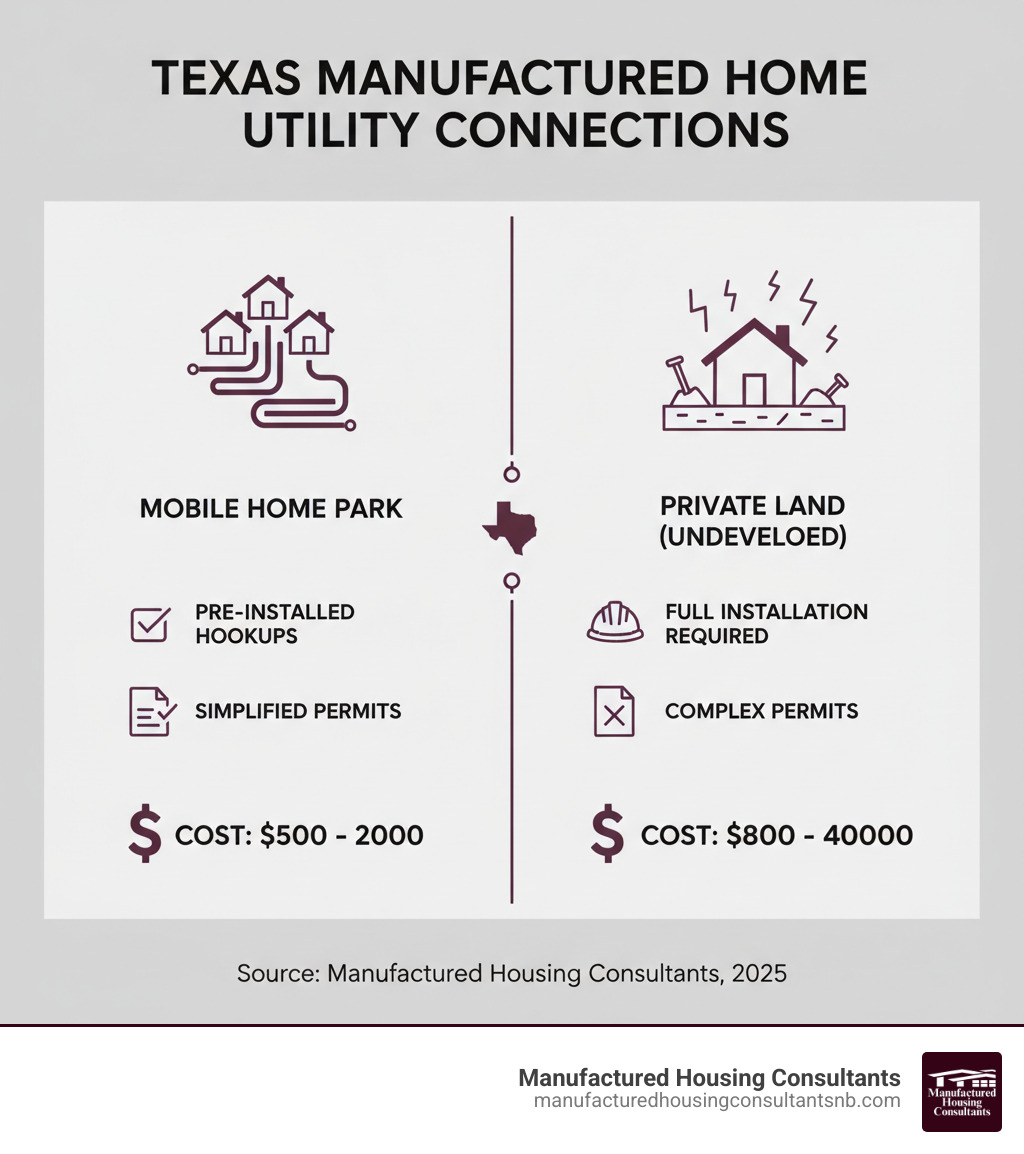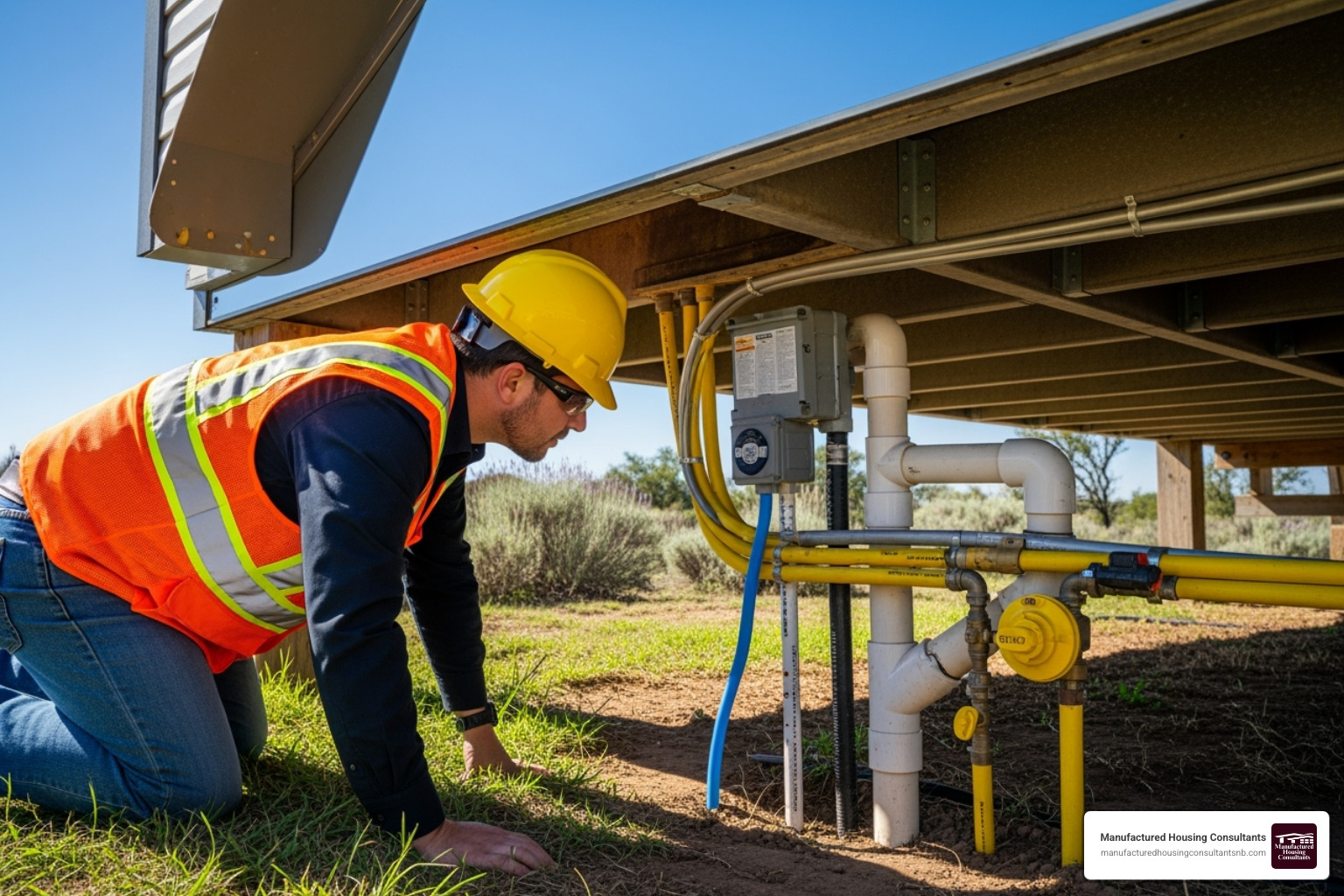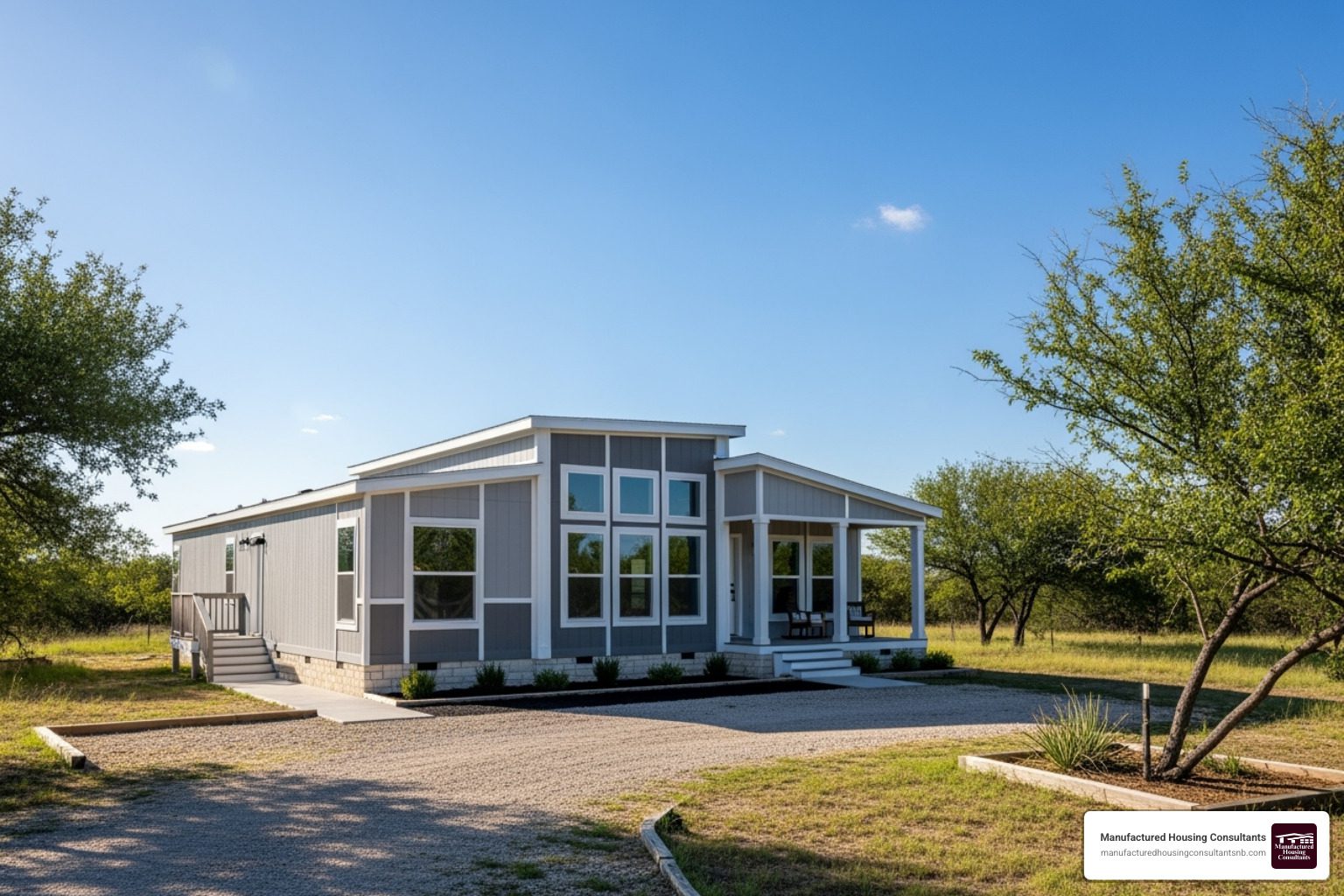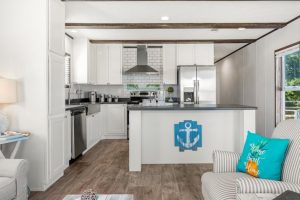Powering Up Your Pad: Understanding Manufactured Home Utilities
Power up your Texas manufactured home! Learn essential utility connections for manufactured homes, from water to electric, and ensure a safe setup.
Understanding Your Essential Connections
Utility connections for manufactured homes are the lifelines that make your house a home, bringing water, power, gas, and waste management to your property. Whether you’re placing your home in a mobile home park or on private land in Texas, understanding these connections is crucial for a smooth, safe, and successful installation.
Quick Answer: The Four Essential Utility Connections
- Water Supply – Municipal hookup or well water system
- Wastewater Management – Public sewer connection or septic system ($3,000-$15,000)
- Electricity – Grid connection or solar power options
- Gas/Fuel – Natural gas line or propane tank installation
Total Cost Range: $8,000-$40,000 for undeveloped land, significantly less in established mobile home parks with existing hookups.
Setting up utilities might sound complex, but the path you take simply depends on your home’s location. In a mobile home park, most of the heavy lifting is already done—utility lines are in place, and you just need professional hookups. On private land, you’re starting from scratch, which means more planning, permits, and upfront costs.
For budget-conscious Texans in the New Braunfels area, understanding these connections before you buy can save thousands of dollars. At Manufactured Housing Consultants, we’ve helped countless families steer this process. We know the local regulations, soil conditions, and utility providers that make Texas installations unique. With proper planning, your utility connections become a straightforward checklist rather than an overwhelming obstacle.

Getting Started: Essential Utilities & Site Considerations
Before you can enjoy your new manufactured home, you’ll need to tackle the “invisible infrastructure”—the essential utility connections that make modern living possible. The process for setting up utility connections for manufactured homes depends entirely on one critical decision: whether you’re settling into an established mobile home park or your own piece of Texas land.
Mobile Home Park vs. Private Land in Texas
We work with families throughout the New Braunfels area, and this is often the first big conversation we have. Both options have their merits, but they’re worlds apart when it comes to utility hookups.
The Mobile Home Park Advantage
For the most straightforward path, a mobile home park is hard to beat. These communities are built for manufactured homes, meaning the heavy lifting is done.
- Pre-Installed Hookups: Water, electrical, and gas lines are typically in place, waiting for your home.
- Simplified Permits: The park has already handled the major infrastructure permitting, simplifying your paperwork.
- Lower Upfront Costs: You’re mainly paying for the final connection from the park’s lines to your home, usually costing a few hundred to a couple of thousand dollars.
The Private Land Journey
Choosing your own land is the dream for many, but it requires more extensive utility planning.
- Site Preparation: Your land must be cleared, graded, and made accessible for utility installation crews.
- Utility Installation Costs: For undeveloped land, expect costs between $8,000 and $40,000. This depends on the distance to existing utility lines and local site conditions.
- Well and Septic Systems: In many rural Texas locations, you’ll need to install a well for water and a septic system for waste. These systems require professional installation, including soil testing for septic viability, and can cost from $3,000 to $15,000 or more.
- Extensive Permitting: You’ll need separate permits and inspections for excavation, electrical, plumbing, and septic work. This is where our land improvement services become invaluable, as we guide New Braunfels-area clients through every step.
Since your foundation choice affects how utilities are routed, understanding your options at Mobile Home Foundation is a crucial part of the planning process.
Key Utilities for Your New Home
Whether in a park or on private land, these utilities are non-negotiable for comfortable Texas living:
- Water Supply: Clean, potable water from a municipal connection or a private well.
- Wastewater Management: Connection to a public sewer or a private septic system.
- Electrical Power: Connection to the local grid or an alternative like solar power.
- Fuel: Natural gas or propane for heating and cooking.
- HVAC Systems: Essential heating and cooling to handle Texas weather.
- Internet and Cable: Necessary connections for modern work, school, and entertainment.
When planning your utility connections for manufactured homes, consider future needs. Oversizing your electrical service or septic system now can save significant expense on future upgrades. Likewise, choosing energy-efficient appliances and insulation from day one will dramatically reduce your monthly utility bills.
The Nitty-Gritty of Utility Connections for Manufactured Homes
Let’s get into the technical details of connecting each utility to your manufactured home. Getting utility connections for manufactured homes right is about safety and compliance, which is why hiring licensed, professional contractors is non-negotiable. The risks associated with DIY work, from electrical fires to gas leaks, are far too great.

Water, Plumbing, and Septic Systems
Proper water and wastewater management is foundational to your family’s health and your home’s function.
- Municipal Water & Sewer: If available, this is the most convenient option. You’ll connect to the city’s main lines, though this often involves significant tapping fees.
- Well Water System: For rural properties, this involves drilling a well, installing a pump, and a pressure tank. Costs can vary based on depth and geology. Water quality testing is an essential step to ensure it’s safe for consumption.
- Septic System: Where public sewer isn’t an option, a septic system is required. This involves a tank and a drain field. In Texas, soil percolation tests are mandatory to determine the appropriate system type for your land. Costs typically range from $3,000 to $15,000.
- Key Considerations: Proper drainage systems are vital to prevent clogs. In Texas, freeze protection for water lines is a must. Exposed pipes should be insulated or protected with UL-listed heat tape made for manufactured homes. A pressure regulator is also needed if your local water pressure exceeds 80 PSI.
At Manufactured Housing Consultants, our land improvement services handle everything from well and septic installation to ensuring proper drainage and freeze protection for our New Braunfels area clients.
Electrical Systems and Power Supply Options
Your electrical system must be installed to meet strict safety codes, including the National Electrical Code (NFPA 70) and HUD standards.
- Electrical Grid: The most common approach is connecting to the local power grid. The cost is directly related to the distance from the nearest power source.
- Solar Power: A sustainable alternative that offers long-term savings and energy independence, though it requires a higher upfront investment.
- Safety Features: Proper grounding is critical to protect against electric shock. GFCI receptacles (with “test” and “reset” buttons) are required in bathrooms, kitchens, and outdoor areas to prevent shock near water. Circuit breakers protect wiring from overloads and prevent fires.
- Maintenance: Test GFCI outlets monthly and call a qualified electrician if you notice flickering lights, warm outlets, or frequently tripping breakers.
Gas, Heating, and Cooling Systems
Reliable heating and cooling are essential in the Texas climate.
- Gas Supply: If available, natural gas is a convenient and cost-effective option piped directly from a utility. Otherwise, propane stored in a tank on your property is an excellent alternative.
- Gas Safety: Gas lines must be professionally installed to code. If you ever smell gas, turn off the main valve, open windows, and call the gas company immediately. Never try to repair gas lines yourself.
- Appliances: Fuel-burning appliances must be specifically labeled for use in manufactured homes, often using sealed combustion systems for safety and efficiency.
- HVAC System: Proper sizing of your heating and cooling unit is crucial for efficiency and comfort. An undersized or oversized system will perform poorly and wear out faster. Professional installation of ductwork and regular filter changes are key to maintaining performance. The type of foundation you choose, such as a Basement Foundation for Mobile Home, can also influence how your HVAC and utility lines are routed.
Ensuring a Smooth, Safe, and Compliant Hookup Process
Connecting your utilities is a carefully orchestrated process requiring professional expertise and strict adherence to regulations. A successful installation depends on hiring the right people, understanding Texas rules, and following best practices.

The Importance of Professionals and Texas Regulations
Attempting DIY utility connections for manufactured homes is dangerous and often illegal. Hiring licensed contractors—plumbers, electricians, and HVAC technicians—is essential for safety and compliance. While professional installation may cost $350 to $600 per day, it’s a necessary investment in your family’s safety and your home’s longevity.
In Texas, the Texas Department of Housing and Community Affairs (TDHCA) and the federal HUD Code govern manufactured housing. However, local codes in areas like New Braunfels add another layer of requirements. The process involves:
- Permitting: Obtaining permits for well drilling, septic systems, electrical service, and gas hookups before work begins.
- Installation: Ensuring all work is performed by licensed professionals according to the National Electrical Code and other relevant standards.
- Inspections: Passing official inspections to verify that every connection is up to code, ensuring your home is safe to occupy.
Best Practices for Your Manufactured Home Utility Connections
To ensure a smooth process, follow these best practices:
- Schedule Early: Coordinate utility installations with your home delivery timeline to avoid move-in delays.
- Coordinate Contractors: Proper scheduling prevents conflicts between different specialists working on your site.
- Plan for the Future: Consider oversizing electrical service or running extra conduit for future additions like a workshop or outdoor kitchen. It’s much cheaper to do it now than later.
- Prioritize Energy Efficiency: Choose energy-efficient appliances, LED lighting, and low-flow fixtures to reduce monthly bills.
- Perform Regular Maintenance: Annually inspect your HVAC system, test GFCI outlets, clean filters, and protect pipes from freezing to prevent small issues from becoming costly emergencies.
For those exploring options in our area, we invite you to visit Manufactured Homes New Braunfels to see what’s available.
Your Partner for a Perfect Texas Home Setup
Navigating utility connections for manufactured homes in Texas can feel complex. You don’t have to do it alone.
At Manufactured Housing Consultants, we are your partners through every step. Based in New Braunfels, we bring invaluable local expertise to your project. We know the soil, climate, and municipal requirements unique to our region.
Our comprehensive land improvement services mean we handle everything from site prep to coordinating all your utility installations with trusted, licensed contractors. This turnkey approach is what we do best. We manage the permits, clarify the costs, and ensure every connection is safe, compliant, and ready for you to enjoy.
Our goal is to transform your empty land into a fully functional, comfortable home, handling the technical complexities so you can focus on the excitement of moving in.
Contact Us today to discuss your project, or Explore our comprehensive services to see how we create seamless, stress-free manufactured home installations.


